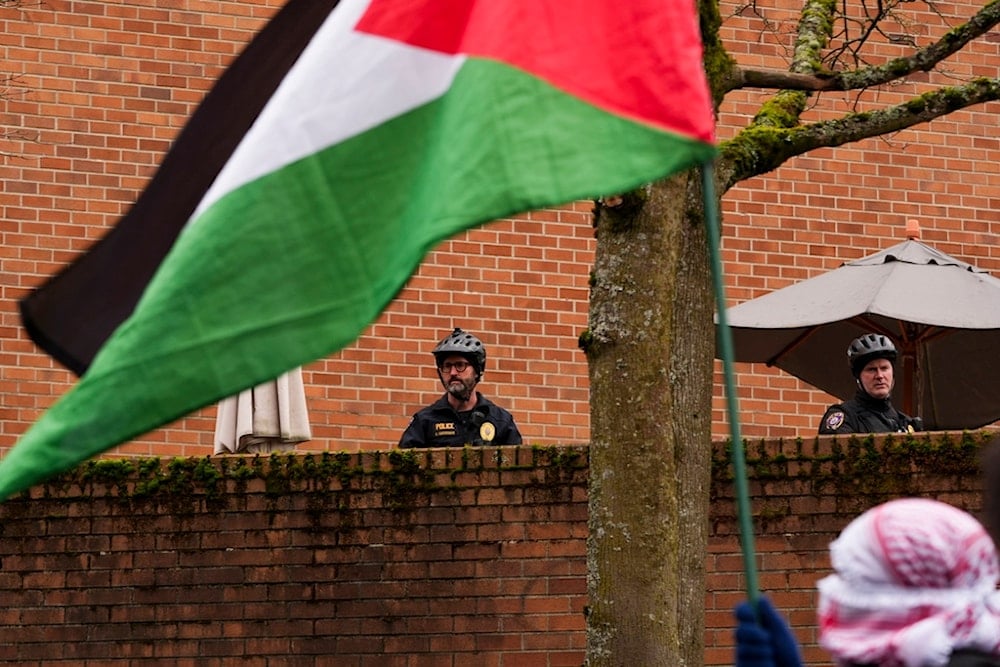UC Berkeley hands Trump officials 160 names in pro-'Israel' probe
UC Berkeley gave the Trump administration the names of 160 faculty and students in an pro-"Israel" inquiry, sparking backlash over academic freedom and privacy.
-

Campus police officers watch as a student-led pro-Palestinian protest marches through the University of Washington campus on Wednesday, February 5, 2025, in Seattle. (AP)
The University of California, Berkeley has come under fire after disclosing that it handed over the names of 160 faculty members, students, and staff to the Trump administration as part of a federal investigation into “alleged antisemitic incidents.” The move has sparked outrage among targeted academics, who likened it to a “McCarthy-era” tactic against dissent on campus.
Letters sent last week by campus counsel David Robinson informed those affected that their names were included in materials provided to the US Department of Education’s Office for Civil Rights (OCR). The office is pursuing investigations tied to Donald Trump’s effort to crack down on pro-Palestinian activism, international students, and academic freedom at US universities.
Judith Butler, a renowned philosopher who has long been critical of Israeli policies, said on Friday that the university had refused to reveal the substance of any complaints. Butler, who is Jewish, called the disclosure “an enormous breach of trust” and said it undermined Berkeley’s tradition as the birthplace of the 1960s Free Speech Movement.
“We have a right to know the charges against us, who made them, and to review and defend ourselves,” Butler said. “But none of that has happened, which is why we’re in Kafka-land.”
Deportation, job loss, and harassment
UC officials confirmed that names were released but said the decision came from the University of California’s systemwide general counsel. A spokesperson said the institution must comply with federal requests while “protecting the privacy” of its community “to the greatest extent possible.”
Butler warned that the list includes lecturers, part-time faculty, and international students who could face deportation, job loss, or harassment. They also said normal campus procedures for handling complaints had been suspended, leaving those named without the chance to respond or even learn if they were accused of antisemitism or simply linked to a broader allegation.
In a letter to Robinson, Butler compared the practice to “well-known” tactics from the McCarthy era, warning it could lead to government surveillance, travel restrictions, or blacklists. “To allow universities to be bossed by political operatives in this way undermines the ideals of critical thought, dissent, and democracy,” they wrote.
'Commitment to transparency'
UC Berkeley has faced growing pressure from the Trump administration over pro-Palestinian activism, including an encampment removed earlier this year after students demanded the school review investments tied to arms manufacturers. The Trump administration has targeted several elite campuses with funding cuts and legal probes over campus protests.
Janet Gilmore, a university spokesperson, said the campus had provided “numerous documents” to federal officials in recent months and was following academic senate guidance to notify individuals when their information is disclosed. “We are committed to transparency and supporting our campus community while complying with federal investigations,” she said.
Leading US universities are increasingly turning to corporate partners for financial support after the Trump administration canceled hundreds of federal research grants, The Wall Street Journal reported in June.
Faculty, trustees, and administrators at institutions like Harvard are now in discussions with major tech and pharmaceutical companies to replace lost government funding, the report said.
Trump facing lawsuits
In early June, faculty members and researchers at the University of California filed a lawsuit against Trump and several government agencies over research funding cuts, NBC News reported.
The professors planned to file the first-ever class action lawsuit challenging the Trump administration's severe reductions in research funding and grants, which have already resulted in layoffs and the discontinuation of many projects, according to the broadcaster.
Claudia Polsky, the founding director of the University of California's environmental law clinic, filed the case in June in the United States District Court in San Francisco.
The station quoted Polsky as saying that while she had not directly been hurt by the budget loss, she was inspired to join colleagues in a lawsuit without institutional backing.

 4 Min Read
4 Min Read










